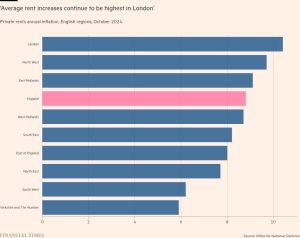Italy retains allure for rich Europeans fleeing higher taxes
Wealthy UK and French taxpayers still want to relocate to Italy despite Rome’s recent decision to double its flat tax on the foreign income of rich expats to €200,000 a year.
With the looming abolition of Britain’s historic “non-dom” tax regime, advisers claim Italy remains a highly attractive alternative.
“People move not just because of tax, but because they might like the Italian Riviera, the Italian Alps, the architecture, culture, people,” said Miles Dean, head of international tax at accountancy firm Andersen, who claimed non-doms were looking to leave the UK “in huge numbers”.
Several consultants in the Eurozone’s third-largest economy say they are receiving a steady stream of inquiries from France, where an unstable political climate has fuelled concerns over higher taxes on the wealthy.
In August, Prime Minister Giorgia Meloni’s rightwing government unexpectedly doubled Italy’s annual levy on overseas income for new tax residents to €200,000 a year.
The move followed grumbles among Italians about the fairness of a flat tax rate set in 2016 as part of a post-Brexit push to lure wealthy people away from the UK. The scheme is estimated to have attracted 2,730 multimillionaires, including oligarchs, private equity investors and even sportspeople, most of whom have set up residence in Milan.
However, Meloni said her government had “considered it right” to update a tax incentive that had seemed “extremely generous”, as the original €100,000 flat tax had not increased since the scheme’s inception.
“The increase from €100,000 to €200,000 does not make a huge difference for multimillionaires that have large foreign incomes,” said Marco Cerrato, partner at tax firm Maisto e Associati in Milan. “Individuals that we have been advising and that have planned to transfer to Italy after 2025 have not changed their plans.”
Maurizio Fresca, an international tax consultant at Italian law firm Chiomenti, said his clients were not so much concerned about the higher tax but about “the politics” behind Rome’s decision, and what that might suggest about the scheme’s long-term durability.
“When high net worth individuals want to relocate to another country, €100,000 a year is not something that holds them back,” Fresca said. “They want to be reassured that this regime will be in force in the future.”
Fresca said Meloni’s government had increased the tax amount to defuse growing public discontent about generous incentives for wealthy foreigners.
“The Italian government wants to avoid a political discussion about the fairness of the lump sum,” Fresca said, adding that €100,000 was seen as “cheap” after several years of high inflation.
Consultants also said Rome had handled the change deftly.
The new rate will only apply to newcomers establishing tax residency in Italy after the change was approved, while existing participants are grandfathered in at the old rate. No other detail has been altered, which had served to reinforce a sense of the scheme’s stability.
Jacopo Zamboni, executive director for private clients at Henley & Partners, which helps wealthy people obtain investment visas and foreign citizenships, said the tax rise was “not perceived as legal uncertainty”.
“Clients see it as an adaptation of the price to the current circumstances,” he said.
Zamboni said inquiries about Italy from British and French residents were up 10 per cent in August this year compared with August 2023.
The increase in the flat tax is expected to discourage some people without sufficient foreign assets or income from making an Italian move. But Cerrato said that could help to avoid a situation in which the incentive scheme is abolished due to “an excessive influx of wealthy foreigners that impact the housing market”.
The participants pay the flat tax on all overseas income and assets for up to 15 years, while shielding them from tax claims elsewhere through double tax treaties.
Many potential beneficiaries were initially wary, given Italy’s reputation for quick changes of government and rapid shifts in policy. But the incentives have proved surprisingly durable. So far they have survived five governments.
The abolition of the non-dom regime in the UK, alongside plans by the new Labour government to raise taxes, has led some current UK residents to consider moving elsewhere.
In France, an inconclusive parliamentary election in July had prompted a flood of calls from wealthy French residents to their advisers seeking options to shift their assets, were a leftwing alliance to take power and reintroduce wealth taxes.
A conservative, Michel Barnier, has instead been appointed prime minister since, although uncertainty over whether the government will hold has added to incentives for people to look for alternatives.
Italy is one of several popular destinations, which also include traditional tax havens Monaco and Switzerland, as well as Dubai, Greece, Cyprus and Malta.
Tax is not the only factor that drives people’s decision making, advisers say. “A lot of these things come down to lifestyle, connectivity,” Dean said. “There is no one size fits all.”
Additional reporting by Sarah White in Paris
#Italy #retains #allure #rich #Europeans #fleeing #higher #taxes







